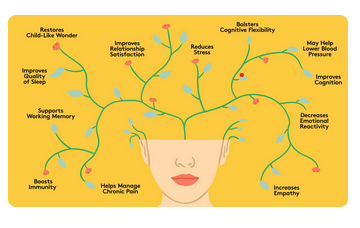Long before the COVID-19 pandemic hit in early 2020, the World Health Organization had been warning that anxiety and depression were the greatest health bur dens on our planet, ranking anxiety as the number one cause of disability globally, outstripping heart disease and even cancer. The ongoing pandemic has only fertilized the roots of something that has been here for a very long time. With chronic uncertainty in the world, more people than ever are having trouble focusing, feeling scattered, and overwhelmed.
In the digital age, the scarcest resource is not time, energy, or love. It’s our attention. The average human attention span has degraded to just below eight seconds. That’s shorter than the attention span of goldfish.
Portable devices have eliminated boundaries between work and home, creating a constant feeling of urgency to tune-in and respond in every waking moment. Our mobile phones alert us to every new email, text, status update, and bargain deal, interrupting and eroding our calm and concentration.
Succumbing to these constant distractions drains our cognitive, emotional, and social intelligence. Our cultural ADD and addiction to social media have had negative consequences both individually and collectively:
- Over 40 million Americans (+20% of the US population) are on prescription medications for anxiety or depression
- 70 million Americans have been diagnosed with a sleep disorder
- And for the first time, the World Health Organization has officially classified workplace burnout as an occupational work hazard
If the pandemic has taught us anything, it’s that we need better ways of working, coping, and being with one another.
Mindfulness training is answering the call. Businesses, senior centers, and fitness facilities are offering mindfulness programs to reduce anxiety. Tech giants like Microsoft and LinkedIn have integrated mindfulness into their workplace health strategies. And elite universities like Harvard Business School and Stanford are teaching mindfulness as part of their leadership curricula.
Why? Because mindfulness delivers results. F-MRI brain studies show that mindfulness training reliably and profoundly alters the structure and function of the brain to improve the quality of thinking, feeling and empathy. It improves both physical and emotional resilience, lessens rates of illness and absenteeism decreasing medical benefit costs.
What is mindfulness training? Science-based mindfulness is a neural process that produces a state of calm, alert awareness and strengthens brain circuits associated with attentional, emotional, and behavioral control. It produces outcomes that improves well being, cognitive performance, and emotional intelligence.
Our most important priorities deserve our undivided attention. Mindfulness training improves mental clarity, communication, and critical thinking which provide skills that can future-proof today’s leaders and develop braver, bolder people for our future.

This article was writting by Lisa Wellstead, Mindfulness Teacher and Trainer.Lisa Wellstead is owner of Wellstead Mindfulness Training and Founder East Cobb Yoga and Mindfulness. She has been practicing, championing, and teaching mindfulness and meditation in the Atlanta community for over 15 years. Lisa has lived in East Cobb since 1990. She currently lives in the Hampton Woods subdivision with her husband Mike. She is the mother of four children: Jordyn, 25; Maddie, 25; Coleman, 23; and Katie, 21.







